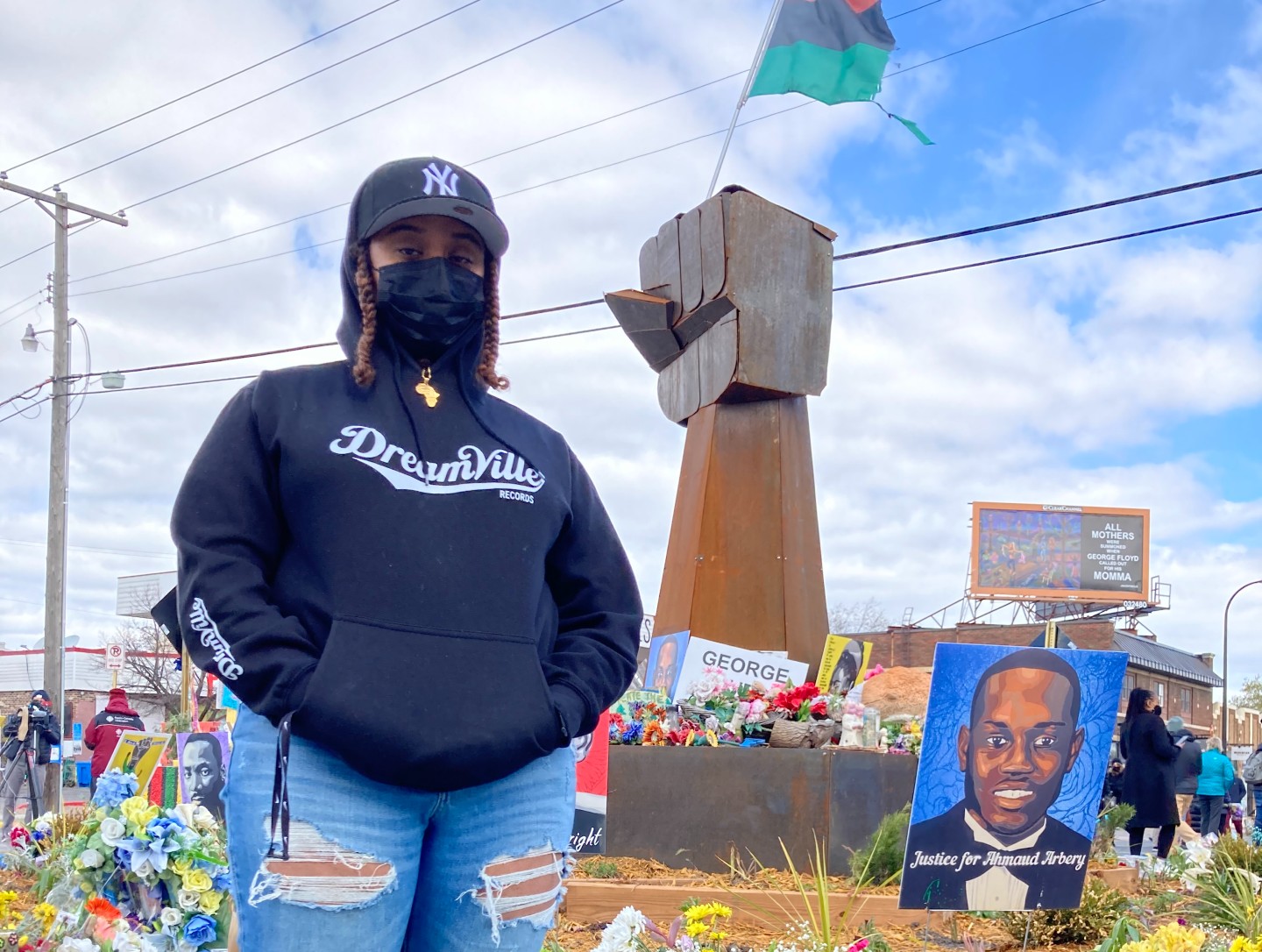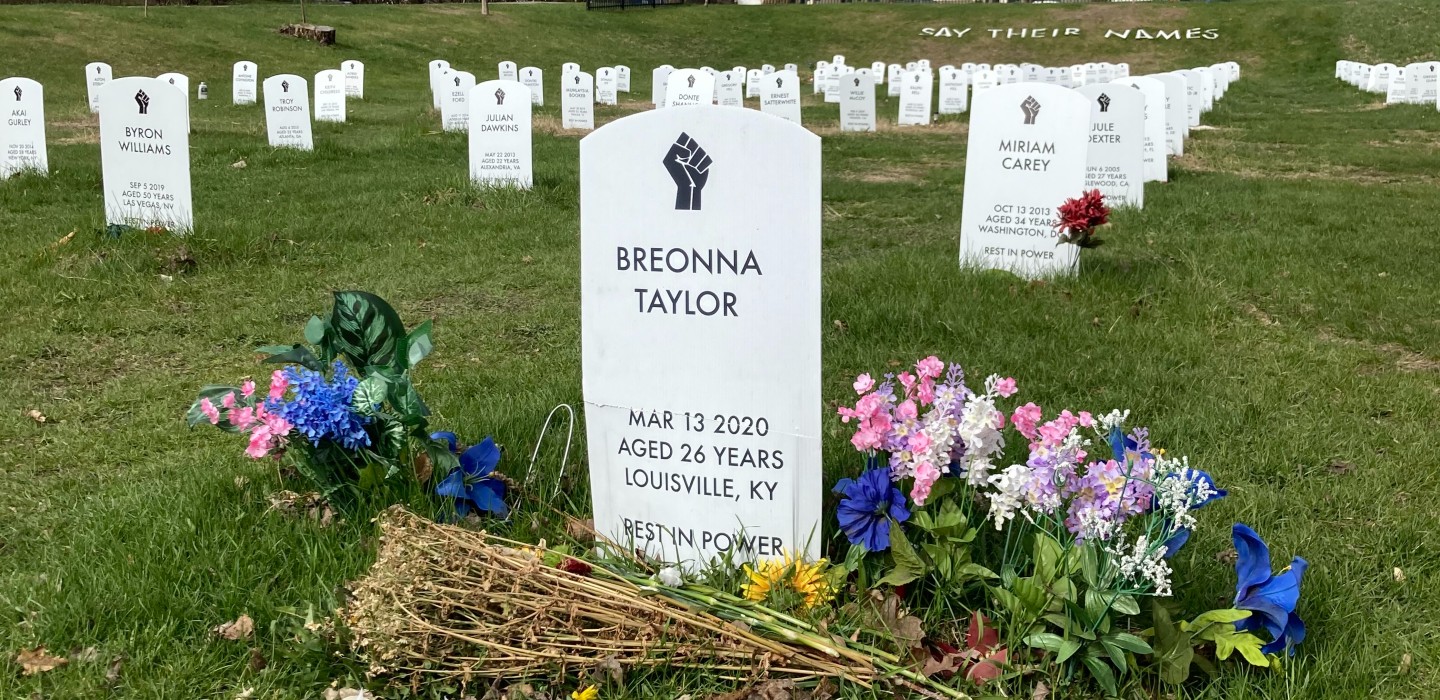
As the nation held its breath, a jury convicted Derek Chauvin of murder and manslaughter in a Hennepin county court on Tuesday. While Minneapolis rejoiced in celebrating an uncommon occurrence of police accountability, young people who showed up at protest sites decried ongoing incidences of police brutality.
Down the block from Chicago Ave. and 38th St., a hub of ongoing protest and memorialization, sits a park with a large open field. On one slope of the park letters spell out “Say Their Names.” Temporary gravestones, 133 in all, cover the field. They bear the names of Black sisters, fathers, community members whose lives the police have taken. Over the summer of racial justice protests, local artists worked to create murals and installations that would reflect the gravity and possibility of the times. Passersby see names such as Tamir Rice, Philando Castille, and Rakia Boyd, as well as U.S. Army soldier Emantic Bradford Jr., Kwesi Ashun, and others whose stories did not receive national attention.

At the autonomous zone known as the George Floyd Square, local residents gathered to reflect and hold space after Tuesday’s verdict.
“This is important to the whole world,” said artist Natnael Bekele of Minneapolis, adding, “The whole world has felt the vengeance of police injustice.” Bekele was active in documenting the uprising and riots that took place last year.
Unjust treatment at the hands of the police is a reoccurring experience for Bekele, who’s been targeted as a Black man and also someone who’s been housing transient. He says that while he was staying at a hotel in the nearby city of Bloomington, staff there called the police on him for missing his checkout time by 30 minutes. Bekele says he was waiting for a load of laundry to finish, which he needed to carry on his person. While he was next door at a restaurant, the police arrived and arrested him.
“I know what it’s like to not only lose your humanity, but also your personal belongings, and in a way your manhood, and also your truth,” Bekele said. He filed a dispute to reclaim the laptop that had been seized from him the day of the arrest, but nothing came of it.
Efrata Solomon, a high school student in St. Paul said she feels a sense of “huge relief after a gut-wrenching trial.” Still, she was dismayed after learning of the shooting of 16-year-old Ma’Khia Bryant in Columbus, Ohio. She said officers spend a disproportionate amount of time in weapons training and lack compassionate communication skills. She said officers making traffic stops should not be allowed to use lethal force.
The New York Times reported that for every day of former MPD officer Derek Chauvin’s trial, police killings occurred throughout the nation. On the first day of trial, 13-year-old Adam Toledo, who was Latino, was shot and killed by an officer while raising his hands in the air; on the day the verdict was read, police shot and killed Bryant in Columbus.
A week earlier and ten miles from George Floyd Square, protesters marched demanding justice for Daunte Wright, the 20-year-old son and father killed during a traffic stop. Wright was Black, and Kim Potter, the officer who shot him while mistaking her gun for her taser, was white. During the traffic stop Brooklyn Center police officers determined he had an outstanding arrest warrant and attempted to take him into custody, which went awry.
“Can you imagine the person you love the most calling you…” civil rights attorneyNekima Levy-Armstrong, said, “and then you not ever being able to hear their voice again because of the color of their skin?” Levy-Armstrong spoke outside the Brooklyn Center Police department last weekend alongside families who’ve lost loved ones to state violence.
They were wearing bathrobes to bring attention to a Black Muslim teenager who was arrested along with her brother, the previous night.

Zaynab Mohamed, a community advocacy manager for the Council on American Islamic Relation (CAIR) said Wright was pulled over for having expired license plates. She mentioned a backlog in processing license plate renewals that’s occurred due to the pandemic, connecting Wright’s death both to the pandemic and institutional racism. Mohammed met with the Brooklyn Center City Council demanding that the chief of police and city manager, who’s overseen aggressive riot police tactics, be fired.
“When we asked how many of the police officers live in the city, it was none,” she said. The City Council voted 3 to 2 to transfer command over the police department to the mayor, who also fired the city manager and accepted the resignation of the police chief.
Community organizations including CAIR have put forth nine bills to the Minnesota legislature to reshape policing. They cover topics such as ending qualified immunity, which provides officers with broad legal protections, and enhancing civilian oversight. While those who bore witness to George Floyd’s murder, and chanted his name in the streets, see Chauvin’s conviction as historic, they continue to struggle for structural changes.
Derek Chauvin is the second Minneapolis police officer to be convicted of murder. The first was Mohammed Noor, a Somali officer who shot and killed a white woman named Justine Ruszczyk in 2017.
As the federal Department of Justice begins its investigation of the Minneapolis Police Department, people on the ground continue to push for justice that protects Black lives rather than memorializes their loss.



